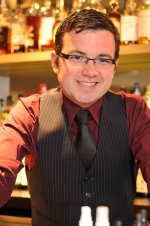Interview with Mixologist Tom Schlesinger-Guidelli of Craigie on Main – Boston, MA
Antoinette Bruno: What drew you to restaurants and, in particular, to mixology? Did you attend culinary school?
Tom Schlesinger-Guidelli: I grew up in the restaurant business, so flavor was always a really interesting thing for me. My uncle always told me I didn't want to cook because he was a cook. He always said where you want to be in a restaurant is bartending, so that's how I kind of fell behind the bar. I don't think at the time he thought it would actually turn into a career for me. I got into that and then I had been bartending for summers for my uncle at one of his seasonal restaurants: The Back Eddy in Massachusetts. I finished college and the season had ended and Eastern Standard had just opened up. I worked behind the bar there for 4 years and got even more behind the cocktails and the flavor under Jackson Cannon. He's one of my best friends. I spent 3½ years as his assistant.
AB: What are the most important restaurants where you staged, apprenticed, or externed?
TSG: Summers for my uncle, then Eastern Standard then here. 3 bartending gigs in total.
AB: Who are your mentors? What are some of the most important things you’ve learned from them?
TSG: Jackson Cannon. It's all about the guest. That's probably the most important question. You try to make sure you have a range of drinks for people and you realize what the different palates are and you try really hard to find a drink for every person. There's a range of people out there and you can appreciate all the flavors.
AB: What goes into creating a new cocktail? What inspires you? How long does it take?
TSG: It starts with the materials around you. Is the menu seasonal enough?
AB: What is your favorite cocktail to drink?
TSG: I had a lavender gin gimlet in the middle of nowhere in Columbus, Ohio in 2005. It was a restaurant with super seasonal food and a garden on the back side. It might have been a vegetarian restaurant. They wouldn't tell me how they did it.
AB: What ingredient or spirit do you feel is underappreciated or under utilized?
TSG: We talked about vermouth and fortified wines in general. Bitters has been picking up but it needs to continue to grow if people are going to make great drinks. Mezcal mixes beautifully.
AB: If you weren’t a mixologist, what would you be doing?
TSG: I would have been working in archeology. I was a double major in archeology and political science and anthropology. I studied abroad in Honduras on archeology trips. But the whole time I was there I was craving mixing drinks.
AB: What are some current trends you’ve seen in the cocktail market? How have trends changed?
TSG: People are putting more attention into making their own cocktail ingredients. I think that's huge and allows you more control over the product you're creating. It's a similar response to what people have. When you look at the chefs’ movement of the 80s into using seasonal and local ingredients, bartending went into that only 3 or 4 years ago. If you're not using fresh citrus now you're so far behind you're not going to catch up. Now it’s about greater control over your vermouth, your bitters. Next wave is to do it all yourself, make your own crème de menthe, curaçao, etc. No one does it extensively in Boston yet, but I think we'll continue to push that movement.
AB: What’s next? Where will we find you in five years?
TSG: Hopefully I'll have my own restaurant or bar. That would be the goal. In Boston, I think. I considered moving to New York or San Francisco to be in a different scene because I think the techniques and ingredients each city uses is different, so just to see what other people are doing would be fascinating. I would love to do stages, but we've only been open for 6 months.

General Manager Tom Schlesinger-Guidelli
Craigie on Main853 Main Street
Cambridge, MA 02139
www.craigieonmain.co..





